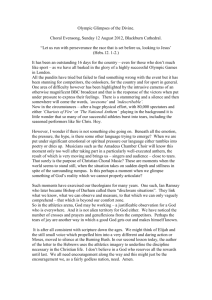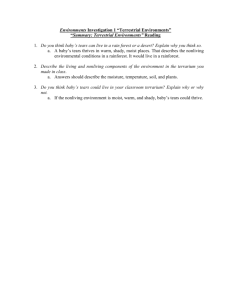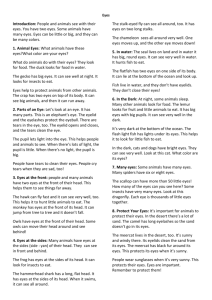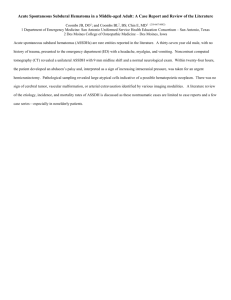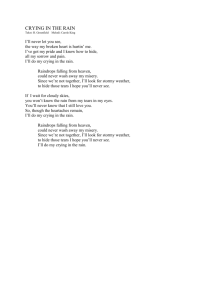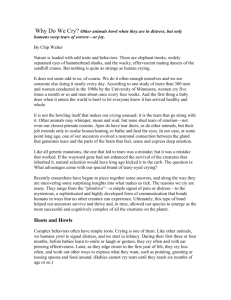Des Moines Register - Iowa State University
advertisement
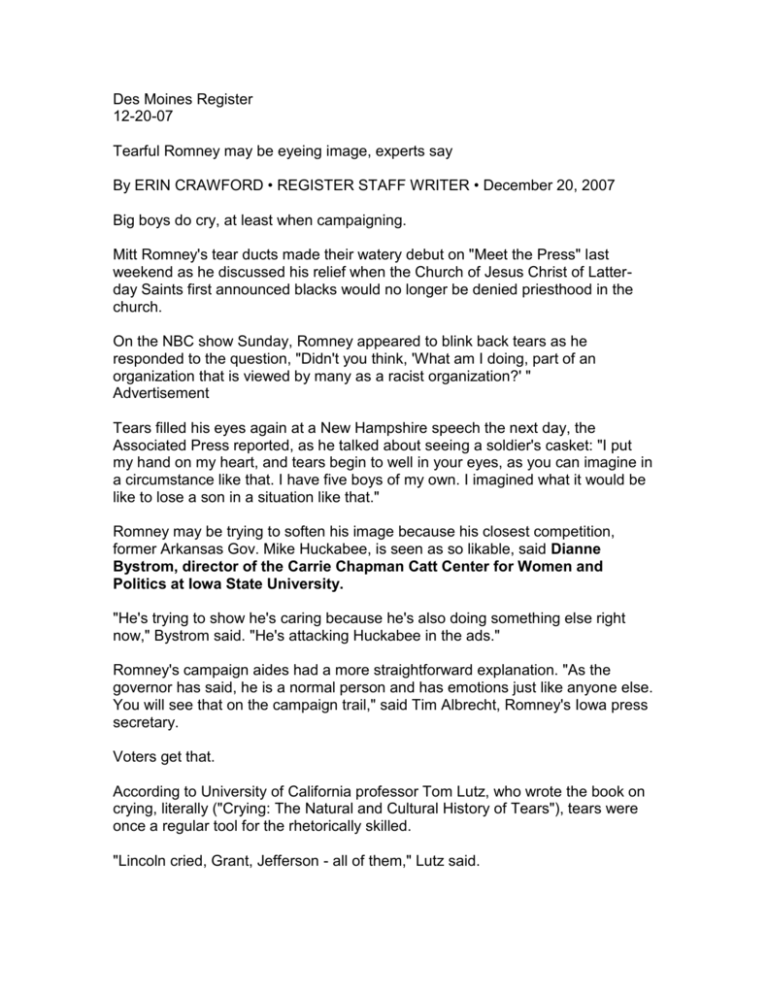
Des Moines Register 12-20-07 Tearful Romney may be eyeing image, experts say By ERIN CRAWFORD • REGISTER STAFF WRITER • December 20, 2007 Big boys do cry, at least when campaigning. Mitt Romney's tear ducts made their watery debut on "Meet the Press" last weekend as he discussed his relief when the Church of Jesus Christ of Latterday Saints first announced blacks would no longer be denied priesthood in the church. On the NBC show Sunday, Romney appeared to blink back tears as he responded to the question, "Didn't you think, 'What am I doing, part of an organization that is viewed by many as a racist organization?' " Advertisement Tears filled his eyes again at a New Hampshire speech the next day, the Associated Press reported, as he talked about seeing a soldier's casket: "I put my hand on my heart, and tears begin to well in your eyes, as you can imagine in a circumstance like that. I have five boys of my own. I imagined what it would be like to lose a son in a situation like that." Romney may be trying to soften his image because his closest competition, former Arkansas Gov. Mike Huckabee, is seen as so likable, said Dianne Bystrom, director of the Carrie Chapman Catt Center for Women and Politics at Iowa State University. "He's trying to show he's caring because he's also doing something else right now," Bystrom said. "He's attacking Huckabee in the ads." Romney's campaign aides had a more straightforward explanation. "As the governor has said, he is a normal person and has emotions just like anyone else. You will see that on the campaign trail," said Tim Albrecht, Romney's Iowa press secretary. Voters get that. According to University of California professor Tom Lutz, who wrote the book on crying, literally ("Crying: The Natural and Cultural History of Tears"), tears were once a regular tool for the rhetorically skilled. "Lincoln cried, Grant, Jefferson - all of them," Lutz said. Crying can humanize a candidate, express empathy and help the person connect with voters. "Sometimes people get caught up in the moment and get emotional," said Terry Crowder, 60, of Topeka, Kan., who was recently in Des Moines for a political rally. "(Orators have to) pull out all the stops to make an impression on voters." Based on online reaction to Romney's appearance, the tears were a non-issue. Most Web watchers weighing in on his "Meet the Press" emotion discussed his religion, not his waterworks. "(Crying) shows their humanity," said Mara Egherman, 42, of Des Moines. "It's not real common in public speaking, but I think it's a good thing. They're under so much stress on the campaign trail. I'm surprised they don't cry more often." Egherman, who is supporting Sen. Barack Obama, said Obama's emotionality adds to his appeal. Lutz credits former President Clinton with bringing tears back into fashion, so much so that his opponent in the 1996 race, Bob Dole, a Kansas Republican, showed similar emotion for the first time in his 40 years as a statesman, tearing up a half-dozen times on the trail, according to Lutz. "It is only in the 20th century that men were uniformly trained not to cry in public, culminating in the tears that wiped Ed Muskie out of the race in the 1970s," Lutz said. During the 1972 campaign, Muskie's wife, Jane, was criticized by the Manchester Union Leader newspaper in New Hampshire for drinking and cursing. Muskie, a Maine Democrat, made an emotional speech defending his wife's honor in which he appeared to be crying, though he later blamed the snow for the tearing up. He ended up losing the nomination. Ironically, "It was Dole who led the attack, as chair of the RNC (Republican National Committee), against Muskie, claiming that those tears showed a level of emotional instability we wouldn't want in the White House," Lutz said. Voters today aren't as concerned with emotional instability as much they are with a trickier question: Were the tears emotionally authentic? Sheri Kirpan, a Des Moines resident who has yet to commit to a candidate, said she has trouble trusting that tears are real. "I think, 'Is this an act? Politicians have a persona,' " she said. Lutz contends Romney's tears are a sign of deeply conflicted emotion. "Romney, I assume, believes that he should be applauded for the religious fervor that so many voters demand of their candidates, and sorely wishes he didn't have this particular albatross around his neck," he said. "He is both proud and ashamed of his Mormonism at this moment." Showing emotion is even trickier for female candidates, the Carrie Chapman Catt Center's Bystrom said. Crying has tanked female politicians in the past. Bystrom cited the example of former Congresswoman Pat Schroeder of Colorado who cried when announcing she was ending her campaign for the Democratic nomination for president in 1988. Media and voters criticized her for being overemotional. In an interview with the Associated Press, Schroeder, who graduated from Roosevelt High School in Des Moines in 1958, said people still contact her, admonishing her for that moment. She once kept a "crying file" to keep track of politicians sobbing, but it got so huge she threw it out. "Guys have been tearing up all along and people think it's marvelous," Schroeder told the AP. Most female candidates struggle to prove they've got the tough factor, Bystrom said. Hillary Clinton doesn't have this problem. Some voters think a few tears might help Clinton, who is spending this week on the campaign trail attempting to personalize her campaign with a new theme: "The Hillary I Know." "I find Hillary Clinton unemotional, cold, and it's hard to connect," said David James, 43, of Des Moines, who added that when it comes to weeping, his litmus test is authenticity. If the candidate's shedding "crocodile tears," it's a turn-off, James said. But in this case, stoicism at the risk of seeming cold may be safer than crying and warming voters up. "She's playing in a man's world and I imagine a lot of women feel the necessity to adapt and embrace male virtues," James said about Clinton. Bystrom said Clinton needs to soften her image and give voters a clearer glimpse of her personal side. Even so, she said, "Female candidates should not cry. ... (They) run the risk of seeming weak and not tough."
